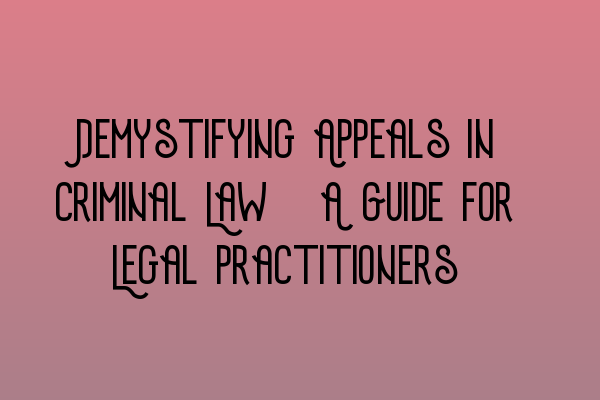Demystifying Appeals in Criminal Law: A Guide for Legal Practitioners
Welcome to the SQE Criminal Law & Practice Law UK blog, where we bring you the latest insights, guidance, and expert advice on all aspects of criminal law. In this article, we will be demystifying appeals in criminal law, providing a comprehensive guide for legal practitioners.
Understanding Appeals
An appeal is a legal process through which a party seeks to challenge and potentially overturn a decision made by a lower court. In the context of criminal law, appeals can be made by both the prosecution and the defense. Appeals give parties an opportunity to raise legal issues, present new evidence, or argue that a mistake was made during the original trial.
It is crucial for legal practitioners to have a thorough understanding of the appeal process and the requirements they need to meet in order to successfully navigate through it. Let’s explore the key aspects of appeals in criminal law:
Grounds for Appeal
Appeals can be pursued on various grounds, including:
- Errors in Law: Identifying mistakes in the application or interpretation of the law can be a strong ground for appeal.
- New Evidence: If new evidence becomes available that could have a significant impact on the case, it may warrant an appeal.
- Procedural Irregularities: Any irregularities in the trial process, such as misconduct by jurors or improper handling of evidence, can provide grounds for an appeal.
The Appeals Process
The appeals process typically involves the following steps:
- Filing a Notice of Appeal: The first step is to file a notice of appeal, which notifies the court and the other parties involved that an appeal is being pursued.
- Legal Submissions: Both the appellant and the respondent will submit written legal arguments presenting their case to the higher court.
- Oral Arguments: In some instances, the parties may have an opportunity to present oral arguments before the higher court.
- Review by Higher Court: The higher court will review the evidence, legal submissions, and consider the arguments presented to decide whether to uphold or overturn the lower court’s decision.
- Judgment: The higher court will issue its judgment, detailing the reasons for the decision.
Effective Appeals Strategy
Developing an effective appeals strategy is essential for success. Here are some key considerations:
- Thorough Case Review: Carefully review the original trial proceedings, evidence presented, and legal arguments to identify potential grounds for appeal.
- Legal Research: Conduct comprehensive legal research to support your appeal arguments.
- Expertise and Guidance: Seek guidance from experienced appellate lawyers who specialize in criminal law.
- Strong Written Submissions: Prepare clear and persuasive written submissions that articulate your legal arguments effectively.
- Oral Advocacy: If granted, utilize the opportunity to present compelling oral arguments before the higher court.
By following these steps and incorporating a well-structured appeals strategy, legal practitioners can maximize their chances of success in challenging a lower court’s decision.
Looking for SQE exam preparation resources? Check out our related articles:
- SQE 1 Practice Exam Questions
- SQE 1 Practice Mocks FLK1 FLK2
- SQE 2 Preparation Courses
- SQE 1 Preparation Courses
- SRA SQE Exam Dates
Remember, appeals play a vital role in the criminal justice system, ensuring fair and accurate outcomes. If you require further assistance or advice on appeals in criminal law, our expert team at SQE Criminal Law & Practice Law UK is here to help. Contact us today to learn more!
